At the Aspen Institute Economic Opportunities Program, and for our many colleagues and partners, the ongoing and intertwined health, economic, and racial justice crises bring new urgency to our work to improve access to quality jobs, options to participate in business ownership, and the freedom to pursue economic opportunity. Below we share our monthly newsletter with highlights of recent work. As always, we welcome your feedback, thoughts, and partnership in advancing inclusive opportunity and an economy in which we all can thrive. Click here to subscribe.
Click here to view past editions of our newsletter
News and Updates
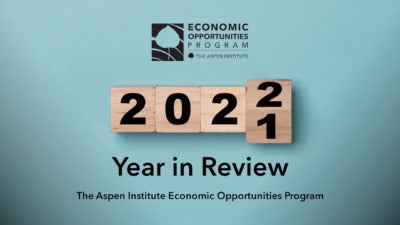
2021 Year in Review
We want to thank you for your partnership through the challenges and upheavals of 2021. Reflecting on our efforts this year, we’re grateful for and proud of the conversations, ideas, and outcomes the EOP team has advanced – all in service to expanding opportunities for America’s working people to earn a living and live with dignity. And we’re optimistic about the opportunities ahead. EOP will build on these efforts by continuing to address the job quality crisis, brightening the prospects of business ownership, and more. Read our 2021 Year in Review.
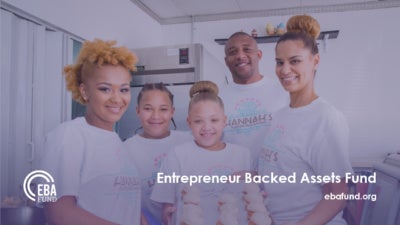
EBA Fund Welcomes New Funding and Commitments
This month we announced $11.5 million in new funding and $6 million in purchase commitments for the Entrepreneur Backed Assets (EBA) Fund. New support comes from Wells Fargo, The Colorado Health Foundation, and the Annie E. Casey Foundation. In addition, multiple banks—including Western Alliance Bank, HTLF through Citywide Banks and Minnesota Bank and Trust, and Byline Bank—committed to purchasing microloans originated by community development financial institutions (CDFIs) from EBA Fund through 2022. To date, EBA Fund has onboarded 14 CDFI partners and completed sales to 10 banks. Of the loans purchased by EBA Fund, 72% are to entrepreneurs of color, 44% are to women entrepreneurs, and 78% are to entrepreneurs in low-income communities. Learn more.
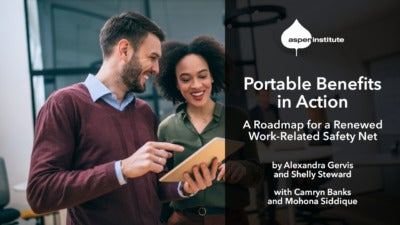
Portable Benefits in Action: A Roadmap for a Renewed Work-Related Safety Net
Millions of people in the U.S. work without access to basic benefits, like health insurance, retirement savings, and paid time off. Most benefits today are attached to a single job—and most too often only to full-time, long-term employment. Portable, universal benefits that are attached to workers rather than to specific jobs offer a promising solution to this benefits access crisis. A new report from Alexandra Gervis, Future of Work Initiative Director Shelly Steward, Research Associate Camryn Banks, and Senior Research Associate Mohona Siddique explains how universal, portable benefits can better deliver benefits to individual workers, encourage a dynamic labor market, and promote economic security for all. Read it here.

Digital Skills Discussion Guide
There is much in the news about technological change, and our research team frequently hears workforce development professionals express concerns about the implications of technology change for job-seekers and workers. In response, we developed a new Digital Skills Discussion Guide to help workforce providers learn how employer partners are integrating technology and upskilling workers. By beginning this learning process, the Guide can facilitate supporting workers adapting to new ways of interacting with their work environments during this digital transformation. The Guide is based on a series of conversations that our research team held with business representatives from a range of industry sectors during 2020 and 2021. Download the Guide.
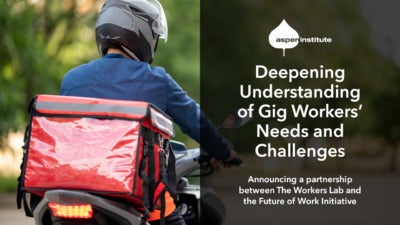
The Workers Lab and Future of Work Initiative Announce Partnership to Deepen Understanding of Gig Workers and Work
The Workers Lab and the Aspen Institute Future of Work Initiative are excited to announce a joint project focused on deepening and amplifying our understanding of gig workers and gig work. Even with a massive increase in gig workers over the last decade, policymakers, elected officials, employers, and society at large lack a comprehensive understanding of gig workers’ diverse needs and what solutions will make the biggest difference in their lives. The project will include undertaking analysis of existing research, hosting forums for open dialogue with workers, and also commissioning our own collaborative research. Our focus is on participatory research methods that start with open-ended questions, and incorporate workers’ perspectives into each iterative stage of the work. Learn more.
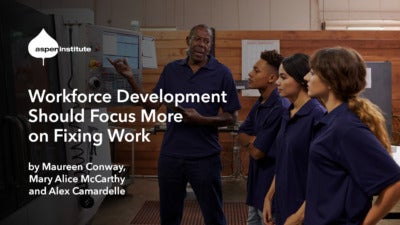
Workforce Development Should Focus More on Fixing Work
While the full scope of recovery investments is not yet clear, it is clear that significant new investments in workforce development will be on the way–but for these resources to live up to their promise of building a better, more inclusive economy, the field of workforce development needs a new narrative that reflects current labor market realities. In an op-ed published by the Spotlight on Poverty, EOP Executive Director Maureen Conway, Mary Alice McCarthy, and Alex Camardelle discuss building a new understanding of workforce development. It’s time for workforce development to build common cause with organizations that share their goal: connecting people to decent, dignified, family-sustaining work. Read the piece here.
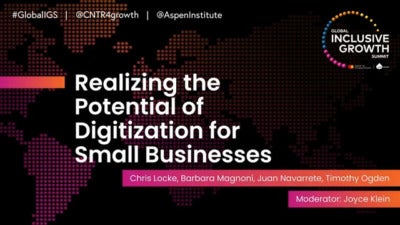
Realizing the Potential of Digitization for Small Businesses
Digitization can help small businesses access information, markets, and financial services, but they face greater barriers than large firms in using technology. This is especially true for small businesses owned by women, racial and ethnic minorities, immigrants, and refugees. How can we help small businesses—which are crucial to employment around the globe—take advantage of this shift? On October 21, Business Ownership Initiative Director Joyce Klein moderated a discussion on Realizing the Potential of Digitization for Small Businesses, part of the 2021 Global Inclusive Growth Summit. A recording of this discussion is now available, and you can view it here. The conversation features Chris Locke (Caribou Digital), Barbara Magnoni (EA Consultants), Juan Navarrete (Fundación Capital), and BOI Senior Fellow Tim Ogden (Financial Access Initiative). Learn more.
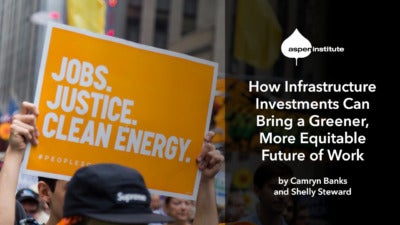
How Infrastructure Investments Can Bring a Greener, More Equitable Future of Work
From rising temperatures to unprecedented weather events, the increasingly apparent impacts of climate change have exposed longstanding infrastructure gaps and prompted new urgency to addressing them. As the U.S. considers the implementation of the substantial infrastructure investments included in the Build Back Better Act, there is an opportunity to chart a different course, to address decades of environmental injustices, and to prepare all people for a brighter future. In October 2021, the Aspen Institute Future of Work Initiative partnered with the Siegel Family Endowment to host a roundtable discussion on how infrastructure investments can facilitate good jobs in an equitable green economy. In a new blog post, Research Associate Camryn Banks and Future of Work Initiative Director Shelly Steward discuss the insights of this discussion. Read more.

Workforce Leadership Academy Fellows Prepare for 2022 Stakeholder Presentations
As part of the Workforce Leadership Academy (WLA) process, Fellows identify opportunities for systems changes within their local communities and then work in collaborative groups to craft strategies for change. This month, the Greater Phoenix WLA Fellows continued interviewing local and national stakeholders to inform their change strategies. Fellows are in the final stretch of creating shared solutions aimed at improvements across four topics: job quality, equity and inclusion in the workplace, collaboration in planning and delivery of workforce services, and ease of navigating the workforce system. We are excited to see what recommendations are put forth to Phoenix stakeholders in early 2022. Stay tuned! Learn more about the Academy.
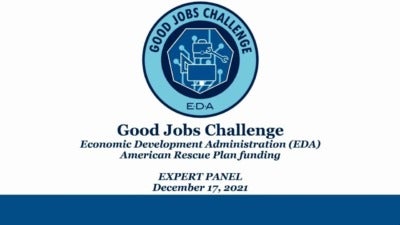
Good Jobs Challenge Expert Panel
On December 17, EOP Executive Director Maureen Conway participated in the Good Jobs Challenge Expert Panel, a virtual event hosted by the U.S. Economic Development Administration (EDA). The first half of the discussion, about Building Effective Partnerships, featured Conway in conversation with Lexi Barrett (U.S. Department of Education), Angela Hanks (U.S. Department of Labor), and moderator Alejandra Castillo (EDA). The second half of the discussion, about Employer Engagement, featured Maurice Jones (OneTen), Kimberly Shin (Talent Rewire), Andy Van Kleunen (National Skills Coalition), and moderator Michele Chang (EDA). The Good Jobs Challenge aims to get Americans back to work by building and strengthening systems and partnerships that bring together employers who have hiring needs with other key entities to train workers with in-demand skills that lead to good-paying jobs. Click here to watch.
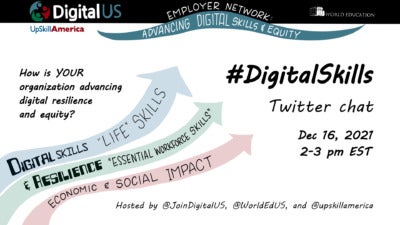
#DigitalSkills Twitter Chat
On December 16, the Employer Network Advancing Digital Skills & Equity—led by Digital US and World Education in partnership with UpSkill America—hosted a Twitter chat on efforts to advance digital resilience and equity. The chat was a lively exchange by participants representing diverse sectors and locations. We thank everyone who took part! You can view the conversation on Twitter through the hashtag #DigitalSkills. Stay tuned for a recap of the discussion. We are currently compiling highlights to share with you in the new year.
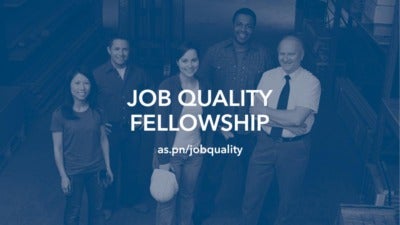
Job Quality Fellowship Webinar and Nominations
Thank you to everyone who nominated a leader for our new cohort of Job Quality Fellows. Eligible nominees have been invited to apply to the Fellowship, with applications due Tuesday, January 4, 2022, at 11:59 p.m. EST. We will announce our new class of Fellows in February.
Fellows will participate in a year-long experience to engage in a process of peer learning and support, strengthen their capacities and expand their networks, and center the importance of job quality in our narratives about work. This class of Fellows will focus on the intersection between workforce development and worker organizing/advocacy. We are excited to work with leaders who are innovative, forward-thinking, passionate about addressing the challenge of equity and inclusion in the US economy, and committed to improving the quality of jobs in the U.S.
On November 30, we hosted an informational webinar about the Job Quality Fellowship featuring Job Quality Fellows Amanda Cage, president and CEO of the National Fund for Workforce Solutions, and Jess Kutch, co-founder and co-executive director of Coworker.org. Click here to watch the recording.
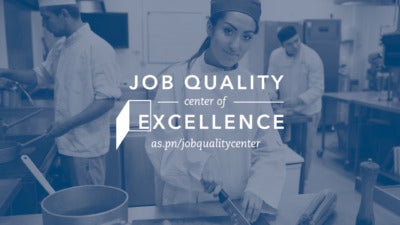
Job Quality Center of Excellence
The US has a job quality crisis. Too many jobs are not quality jobs, and too much has gone into “fixing workers.” Now is the time to “fix work.” In response, last month we launched the Job Quality Center of Excellence, a new platform that aims to drive improved job quality and economic dignity for workers through deep stakeholder engagement, idea generation, and resource sharing to help equip leaders across sectors and at all levels to act. At the Center, you’ll find exemplars, practical tools, inclusive conversations, and research and resources. The Center draws on the work of the Economic Opportunities Program and others who are innovating to improve job quality. Please turn to the Center as a resource and forum for sharing fresh approaches. Click here to visit.
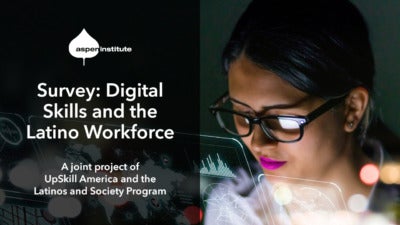
Digital Skills and the Latino Workforce
Thanks to everyone who participated in our survey on digital skills and the Latino workforce, released by UpSkill America in partnership with the Institute’s Latinos and Society Program. Results of the survey will be shared through a written report and a virtual public presentation in 2022. The survey aimed to study how employers feel about the digital skill needs of their companies, the type of resources employers and workforce development organizations need to support digital skills development, and the types of programs employers and education and training providers are investing in for the Latino workforce. This work builds on UpSkill America’s year-long study to learn how the pandemic and heightened attention to racial inequities have influenced companies’ skill needs, hiring practices, education and training programs, diversity, equity and inclusion work, and worker supports. Learn more.
Upcoming Events
EOP will continue to host virtual events and webinars this season. Join our mailing list and follow us on social media to learn when new opportunities are available.
Join the conversation
Follow EOP on social media to join the conversation!
-Workforce Strategies Initiative @AspenWorkforce
-Business Ownership Initiative @Aspen_BOI
-UpSkill America @upskillamerica
-Future of Work Initiative @AspenFutureWork
About EOP
The Aspen Institute Economic Opportunities Program (EOP) advances strategies, policies, and ideas to help low- and moderate-income people thrive in a changing economy. We recognize that race, gender, and place intersect with and intensify the challenge of economic inequality and we address these dynamics by advancing an inclusive vision of economic justice. For over 25 years, EOP has focused on expanding individuals’ opportunities to connect to quality work, start businesses, and build economic stability that provides the freedom to pursue opportunity. For more information, visit as.pn/eop.
EOP has several initiatives, including the Business Ownership Initiative, Workforce Strategies Initiative, UpSkill America, Good Companies/Good Jobs, and the Future of Work Initiative. In addition, across these approaches EOP hosts the Economic Opportunity Fellows Network and the Opportunity in America event series.
Thank you to our many partners and funders for supporting our efforts.
Support Our Work
We are committed to making our events and publications freely available to everyone who finds them useful. But if you find value in our work and are able to support it, please consider making a tax-deductible donation. Click here to learn more.
Keep in Touch
Click here to join our mailing list. For updates every day, follow us on social media.

